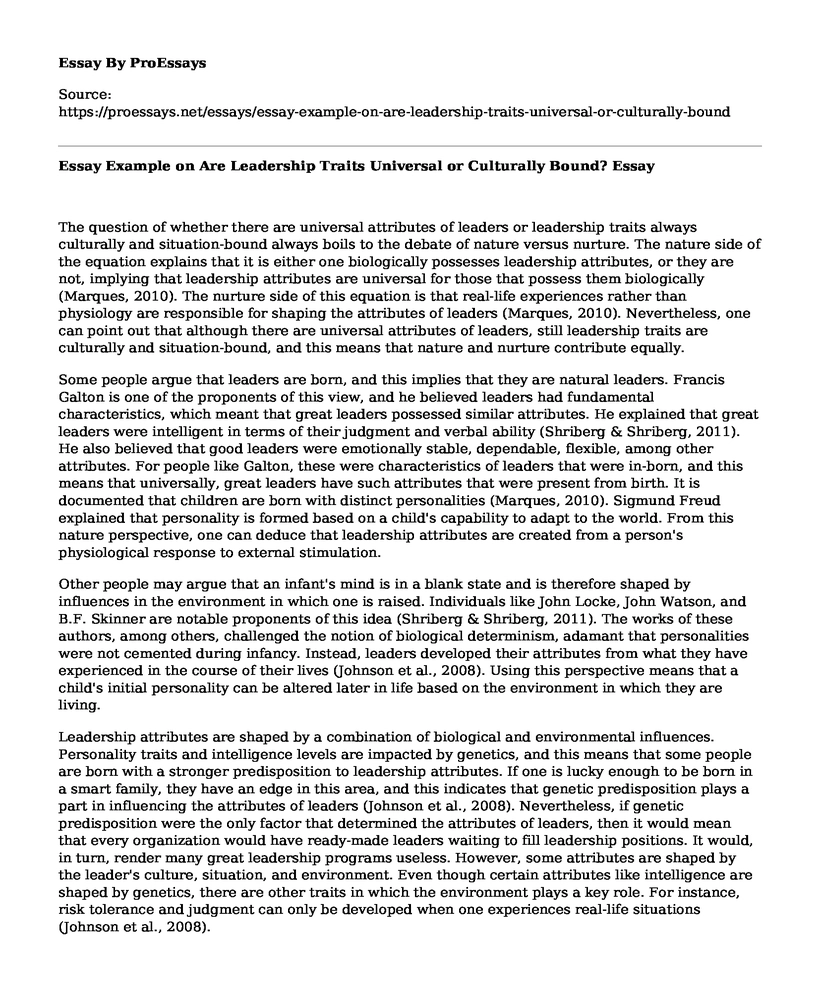The question of whether there are universal attributes of leaders or leadership traits always culturally and situation-bound always boils to the debate of nature versus nurture. The nature side of the equation explains that it is either one biologically possesses leadership attributes, or they are not, implying that leadership attributes are universal for those that possess them biologically (Marques, 2010). The nurture side of this equation is that real-life experiences rather than physiology are responsible for shaping the attributes of leaders (Marques, 2010). Nevertheless, one can point out that although there are universal attributes of leaders, still leadership traits are culturally and situation-bound, and this means that nature and nurture contribute equally.
Some people argue that leaders are born, and this implies that they are natural leaders. Francis Galton is one of the proponents of this view, and he believed leaders had fundamental characteristics, which meant that great leaders possessed similar attributes. He explained that great leaders were intelligent in terms of their judgment and verbal ability (Shriberg & Shriberg, 2011). He also believed that good leaders were emotionally stable, dependable, flexible, among other attributes. For people like Galton, these were characteristics of leaders that were in-born, and this means that universally, great leaders have such attributes that were present from birth. It is documented that children are born with distinct personalities (Marques, 2010). Sigmund Freud explained that personality is formed based on a child's capability to adapt to the world. From this nature perspective, one can deduce that leadership attributes are created from a person's physiological response to external stimulation.
Other people may argue that an infant's mind is in a blank state and is therefore shaped by influences in the environment in which one is raised. Individuals like John Locke, John Watson, and B.F. Skinner are notable proponents of this idea (Shriberg & Shriberg, 2011). The works of these authors, among others, challenged the notion of biological determinism, adamant that personalities were not cemented during infancy. Instead, leaders developed their attributes from what they have experienced in the course of their lives (Johnson et al., 2008). Using this perspective means that a child's initial personality can be altered later in life based on the environment in which they are living.
Leadership attributes are shaped by a combination of biological and environmental influences. Personality traits and intelligence levels are impacted by genetics, and this means that some people are born with a stronger predisposition to leadership attributes. If one is lucky enough to be born in a smart family, they have an edge in this area, and this indicates that genetic predisposition plays a part in influencing the attributes of leaders (Johnson et al., 2008). Nevertheless, if genetic predisposition were the only factor that determined the attributes of leaders, then it would mean that every organization would have ready-made leaders waiting to fill leadership positions. It would, in turn, render many great leadership programs useless. However, some attributes are shaped by the leader's culture, situation, and environment. Even though certain attributes like intelligence are shaped by genetics, there are other traits in which the environment plays a key role. For instance, risk tolerance and judgment can only be developed when one experiences real-life situations (Johnson et al., 2008).
Conclusion
There are universal attributes of leaders, and at the same time, leadership traits are culturally and situation-bound, and this means that nature and nurture contribute equally. Both work in a combination to shape leadership attributes in that, even in the presence of genetic predisposition of traits like intelligence, other attributes like judgment depend on the environment. Nevertheless, it is essential for an individual who aspires to lead others to focus on developing their leadership skills because becoming an effective leader means learning more to develop leadership qualities.
References
Johnson, A., Vernon, P., McCarthy, J., Molson, M., Harris, J., & Jang, K. (2008). Nature vs. nurture: Are leaders born or made? A behavior genetic investigation of leadership style. Twin Research, 1(4), 216-223. doi: 10.1375/twin.1.4.216
Marques, J. (2010). Awakened leaders: born or made?. Leadership & Organization Development Journal, 31(4), 307-323. doi: 10.1108/01437731011043339
Shriberg, D., & Shriberg, A. (2011). Practicing leadership: Principles and applications. Hoboken, NJ: Wiley.
Cite this page
Essay Example on Are Leadership Traits Universal or Culturally Bound?. (2023, Apr 09). Retrieved from https://proessays.net/essays/essay-example-on-are-leadership-traits-universal-or-culturally-bound
If you are the original author of this essay and no longer wish to have it published on the ProEssays website, please click below to request its removal:
- Argumentative Essay Example on Management of Diverse Teams in Organizations
- Essay Example on Management of Hospitals
- Leadership Concepts and Practice Essay
- Meals on Wheels Organization Planning Paper Example
- Kenny's Transformational Leadership Paper Example
- Paper Example on ACTWU Organizing Effort: SGA Industries Crisis
- Free Report Sample on Criminal Intelligence Agency: Leveraging Math Models to Improve Decision-Making







